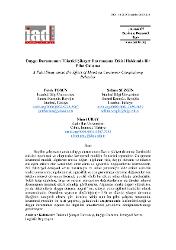| dc.contributor.author | Tosun, Petek | |
| dc.contributor.author | Sezgin, Selime | |
| dc.contributor.author | Uray, Nimet | |
| dc.date.accessioned | 2020-08-24T10:32:24Z | en_US |
| dc.date.available | 2020-08-24T10:32:24Z | en_US |
| dc.date.issued | 2018 | en_US |
| dc.identifier.issn | 1309-0712 | en_US |
| dc.identifier.uri | https://hdl.handle.net/20.500.12469/3242 | |
| dc.identifier.uri | https://search.trdizin.gov.tr/yayin/detay/305731 | |
| dc.description.abstract | Bu pilot çalışmanın amacı, duygu durumunun tüketici şikâyet davranışı üzerindeki
etkisini incelemek ve oluşturulan kavramsal modelin ön testini yapmaktır. Çalışmanın
kavramsal modeli, algılanan marka değeri, algılanan risk, duygu durumu ve tüketici
etkileşim stilleri olan kendinden emin olma ve agresiflik değişkenlerini içermektedir.
2x2 faktöriyel deneysel serim tasarımıyla ve anket yöntemiyle elde edilen verilerin
analizi sonucunda, algılanan risk, agresiflik ve rıza göstermeye direnme değişkenlerinin,
tüketici şikayet davranışı üzerinde pozitif yönlü bir etkiye sahip olduğu görülmüştür.
Telafi talep edebilme, bilgi ve yardım isteyebilme değişkenlerinin ise tüketici şikayet
davranışının üzerinde etkili olmadığı görülmüştür. Algılanan marka değeri yüksek ise,
ya da tüketicilerin duygu durumu negatif ise, şikayet etme eğilimi istatistiki olarak
artmamaktadır. Örneklem sayısının düşüklüğü (n=118) ve tüketici şikayet davranışı
ölçeğinin kategorik olması gibi kısıtlara sahip olan bu pilot çalışma sonucunda,
kavramsal modelin ön testi yapılmış, gelecekteki araştırmalarda kullanılabileceği ve
duygu durumunun e-posta ile dağıtılan anketlerdeki görsellerle değişimlenebileceği
görülmüştür. | en_US |
| dc.description.abstract | The purpose of this study is to examine the effect of mood on consumer
complaining behavior (CCB) and do the pilot testing of the proposed conceptual
framework. The conceptual framework includes perceived brand value, perceived risk,
mood, and consumer interaction style constructs, which are, aggressiveness and
assertiveness. The data collected by questionnaires as a part of 2x2 between-subjects
factorial experimental design, have shown that perceived risk, aggressiveness, and
resisting requests for compliance have positive effect on CCB. Consumers who are in a
negative mood and perceive high brand value are slightly more likely to complain, but
not significant in explaining CCB. Despite the limitations of small sample size (n=118)
and a use of categorical treatment of CCB scale, this pilot study reveals that online
mood induction with photographs is an acceptable manipulation method; the
conceptual model is valid to be re-tested in future studies. | en_US |
| dc.language.iso | tur | en_US |
| dc.publisher | Melih Topaloğlu | en_US |
| dc.rights | info:eu-repo/semantics/openAccess | en_US |
| dc.subject | Tüketici Şikayet Davranışı | en_US |
| dc.subject | Duygu Durumu | en_US |
| dc.subject | Deneysel Serim | en_US |
| dc.subject | Logistik Regresyon | en_US |
| dc.subject | Consumer Complaining Behavior | en_US |
| dc.subject | Mood | en_US |
| dc.subject | Experimental Design | en_US |
| dc.subject | Logistic Regression | en_US |
| dc.title | Duygu Durumunun Tüketici Şikayet Davranışına Etkisi Hakkında Bir Pilot Çalışma | en_US |
| dc.type | article | en_US |
| dc.identifier.startpage | 627 | en_US |
| dc.identifier.endpage | 645 | en_US |
| dc.relation.journal | İşletme Araştırmaları Dergisi | en_US |
| dc.identifier.issue | 2 | en_US |
| dc.identifier.volume | 10 | en_US |
| dc.department | Fakülteler, İşletme Fakültesi, İşletme Bölümü | en_US |
| dc.institutionauthor | Uray, Nimet | en_US |
| dc.relation.publicationcategory | Makale - Ulusal Hakemli Dergi - Kurum Öğretim Elemanı | en_US |
| dc.identifier.trdizinid | 305731 | en_US |
















